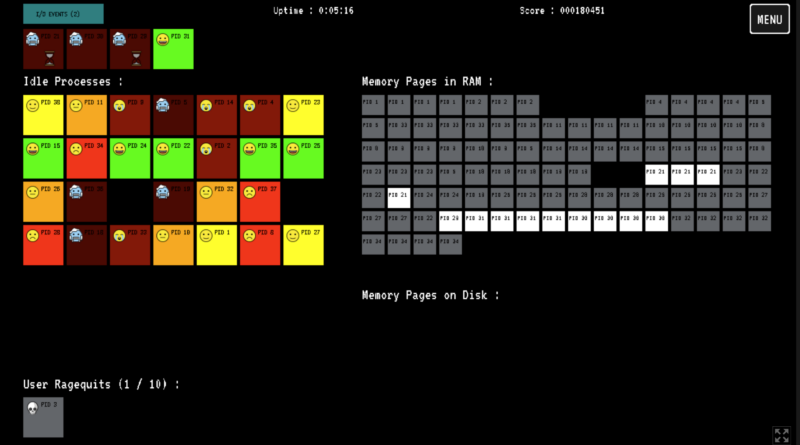
I spent nearly 20 minutes this morning trying to be a good operating system, but you know what? People expect too much of their computers.
I worked hard to rotate processes through CPU slots, I was speedy to respond to I/O requests, and I didn’t even let memory pages get written to disk. But the user—some jerk that I’m guessing keeps 32 shopping tabs open during work—kept rage-quitting as processes slid in attrition from bright green to red to “red with a frozen face emoji.” It made me want to get four more cores or potentially just kill a process out of spite. If they were a writer, like me, I’d kill the sandboxed tab with their blog editor open. Learn to focus, scribe!
You’re the OS! is a browser game that combines stress, higher-level computer design appreciation, and panic-clicking exercise. Creator Pier-Luc Brault says specifically that the game “has not been created with education in mind,” but it might introduce people to principles like process scheduling and memory swapping—”as long as it is made clear that it is not an exact depiction.” Brault, a computer science teacher himself, writes that they may use the game to teach about cores, RAM shortages, and the like.
-
The tutorial is pretty good at explaining the basics, but you’ll need to play once or twice to get a feel for what’s really happening.
-
Everything wants your attention all the time, it seems, and that is how I started equating an operating system to a kindergarten teacher at recess in my mind.
-
Here’s one of my first attempts, lasting less than 7 minutes on easy mode against the forces of binary entropy.
You can click the “How to Play” button to get a step-by-step walkthrough, but the gist of the game is that processes keep popping up, and you have to address them. You have four CPU slots by default (adjustable in-game settings), so you click processes to move them into a CPU and work them. The processes are green and smiley when they appear, then degrade to orange, red, deep red, and then red and freezing as you ignore them for other processes. Working each process also takes up memory pages in memory, and filling up your allotment can move memory pages to disk, from which a process really does not want to work. And then sometimes processes are frozen until you click a little button to handle “I/O Events.”
What this looks like when you’re actually playing is pure triage, scanning and clicking and sacrificing processes you think can last just a bit longer while you deal with other stuff. Do you click the I/O Events button and wait to see if it unlocks that red process in your CPU core, or immediately dump the locked process in favor of something else deserving? It’s your job to answer this question because, well, you’re the OS.
As processes become irretrievably locked up, your user rage-quits them. After 10 rage-quits, they reboot the system. You’re the system, you’re the one they’re rebooting. You saw what it was like to be an OS, and you failed at it. How do you feel now? Want to play again?
I made it 6 minutes 25 seconds on my first attempt on Easy, and then I realized I needed to switch from the reliable trackball I use for work to an actual mouse. My second attempt was 7:19, and my wrist was very mad at me. It’s not the game’s fault entirely—I brought my pandemic-derived carpal tunnel issues to it—but if you’re not ready to click a lot, I suggest either playing in moderation or trying the game in a mobile browser. It’s actually a pretty fun game to play with your fingers on a mobile device, especially a tablet or a larger phone. I’ve saved a bookmark of this game to my home screen for my next subway ride.
One coworker at Ars will not be bookmarking this game. It is, they said, “a genre of plate-spinning simulator I find kinda overwhelming. It’s well done! Just too much.”
You’re the OS (which I first saw via Clive Thompson) is an HTML5 game that’s licensed under the GPL 3 and runs on Itch.io. You can also run the game as a desktop app or build the web version for modification, as detailed on the game’s GitHub repository.
https://arstechnica.com/?p=1960915

